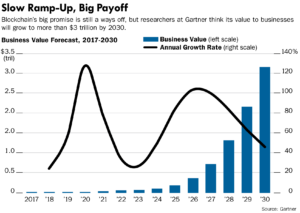Blockchain Is Starting to Show Real Promise Amid the Hype
 Projects that actually solve real-world problems are much rarer. The research firm Gartner surveyed 3,160 chief information officers this year and found that only 1% had put blockchain to work.
Projects that actually solve real-world problems are much rarer. The research firm Gartner surveyed 3,160 chief information officers this year and found that only 1% had put blockchain to work.
Take the Australian mining giant BHP Billiton (ticker: BHP), which announced in 2016 that it would use blockchain to track its supply chain, including the movement of rock and fluid samples. But after the company tested it in a pilot project, a BHP executive said this month that the technology “hasn’t reached the point of maturity where we think it applies to us.”
Still, it’s a bit like trying to pick future winners and losers of the internet back in the early 1990s. Tomorrow’s Facebook—and its Pets.com—are not yet visible on the horizon.
“Blockchain is not a technological solution to a technological problem,” he says. “It’s a technological solution to a political problem. A political problem within business. You don’t want a PayPal or an eBay or an Uber or a Facebook at the center of a lot of markets, because that gives a tremendous amount of power to those entities, greater than arguably even AT&T had when it was at the center of the phone market.”
“Fifteen years ago, if someone had said to you we’re going to see the advent of the self-driving car on the streets before we see T+2 settlements [trades getting settled two days after they take place] and before you can walk from one doctor’s office to the next and have your health-care records precede you there, you would have been declared crazy, right?” Masters says.
“It is those kind of delays and extraordinary inefficiencies that have plagued financial services and big enterprises in other industries like health care.
For investors, there are few ways to invest directly in blockchain. Some exchange-traded funds have been introduced, including Amplify Transformational Data Sharing (BLOK), Reality Shares Nasdaq NexGen Economy (BLCN), and Innovation Shares NextGen Protocol (KOIN), but they offer minimal real revenue exposure to the technology, which is currently generating little revenue.
AXA (CS.France), the French insurance company, is using blockchain technology to transform the flight-insurance industry. Its product, called Fizzy, allows fliers to buy insurance that immediately pays out if their flight is delayed by more than two hours, for any reason.
“Blockchain challenges what you do rather than amplifying what you do,” said Rajesh Kandaswamy of Gartner. “Technologies like mobile amplify what you do. Mobile was additive for banks. Blockchain as an underlying technology makes you rethink your business processes or even your business model. That will take years for people to pass.”
Walmart, Nestlé, Dole Food, and other companies are building a platform with IBM called Food Trust that would put the whole food-supply chain—farm to supermarket —on a blockchain that presumably can track the entire chain in seconds. The software can now track about 50 products, far from the whole supermarket but enough to get a sense of the software’s viability.
That includes more than following a head of lettuce as it’s trucked across the country; the software has been tested on trickier tasks, like tracking all of the ingredients in a container of Gerber’s sweet potato-apple-pumpkin puree baby food.
See the full story here: https://www.barrons.com/articles/blockchain-is-starting-to-show-real-promise-amid-the-hype-1534554901
Also see - U.S. experts optimistic about broad application prospects of blockchain
http://www.xinhuanet.com/english/2018-08/20/c_137404059.htm
Pages
- About Philip Lelyveld
- Mark and Addie Lelyveld Biographies
- Presentations and articles
- Tufts Alumni Bio